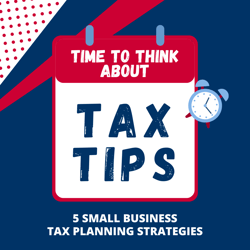 As the end of the year approaches, it’s time for small business owners to put tax planning on their radar. You have until December 31 to make some strategic moves that can help you take advantage of more tax breaks, maximize your tax deductions, and minimize the amount you’ll owe when tax filing time comes.
As the end of the year approaches, it’s time for small business owners to put tax planning on their radar. You have until December 31 to make some strategic moves that can help you take advantage of more tax breaks, maximize your tax deductions, and minimize the amount you’ll owe when tax filing time comes.
Keep these five year-end tax planning tips in mind to help place your small business in the best position possible when tax season rolls around.
1. Meet with Your CPA as Soon as Possible.
Here’s our top small business tax planning tip: Schedule a meeting with your CPA or Oregon Licensed Tax Advisor as soon as possible. This will ensure that your Oregon small business will benefit from all the tax deductions and credits it is entitled to.
It’s also a good idea to have a certified public accountant review your business financials to estimate your tax liability, suggest any tax planning actions you might want to take before the end of the year, and explain what supporting records will be needed to file your taxes.
Having a strategic tax preparation meeting now will help eliminate unpleasant surprises when tax filing time arrives.
2. Evaluate Your Business Structure.
It’s not uncommon that small businesses start up as a sole proprietorship because it is the easiest. A sole proprietor is considered a “pass-through” entity. This means that the income and expenses from your sole proprietorship small business are simply passed on to your individual tax return and recorded on a Schedule C (Form 1040).
But as your small business grows and evolves, another structure might be more appropriate. You should be sure to talk with your legal and tax advisers about whether it would be beneficial to instead form an LLC (limited liability company) or a corporation. These business structures help to protect your personal assets from liability. If your business’s profits are growing, an S corporation election might be helpful to reduce your overall tax liability.
It’s important to discuss these different business structures with your CPA or other tax advisers to determine the right fit for your small business.
3. Consider Income Deferral or Acceleration.
If your small business reports its taxes on a cash basis, you might be able to reduce the current year’s income tax bill by deferring (in other words, delaying) some of your income to the next year.
If you have invoices that you haven’t yet sent to your customers or receivables that you haven’t yet collected, you could consider waiting until January 2024 to send them so that the income won’t be taxable on your 2023 tax return.
On the other hand, if you expect an increase in profits that will put you in a higher tax bracket in 2024, you may want to collect the income in 2023 rather than deferring it to a potentially higher tax year. Ask your tax adviser to help you determine whether it makes sense to accelerate or defer some of your income based on the specifics of your situation.
And remember, if you use accrual accounting, you can’t use this tip. You will have to record revenue when the transaction actually occurs.
4. Leverage Last-Minute Deductions.
Here’s a related small business tax planning tip: Consider whether you should make any planned purchases before year-end so that you can deduct those expenses on your 2023 tax return.
To enjoy even more tax deductions, cash-basis business taxpayers can consider prepaying for services that their company will be using in the coming year, such as business insurance, rent, professional memberships, and other guaranteed fixed expenses.
The holiday season is also a great time for small business owners to make donations to their favorite charities. (Charity Navigator and Guidestar are sites you can use to find high-quality charities that align with your interests and passions.)
Check with your tax advisor to see whether your business can benefit from tax-deductible year-end charitable contributions. It may depend on your legal business formation and whether you have itemized deductions. Click here to see the IRS rules on charitable contribution deductions.
5. Make Contributions to Your Retirement Accounts.
As a self-employed business owner, the contributions you make to your retirement plan may reduce your taxable income. This is a great way to invest in your future and reduce your tax liability at the same time, so consider making the maximum contribution allowed.
Also, if you have employees and your small business does not already offer an employee retirement plan, the end of the year is a great time to set one up. This is good for your employees but also offers many tax incentives for you as a business owner.
Small businesses may be eligible to receive a tax credit to help cover the startup costs for various types of employee retirement plans, like a SEP, a SIMPLE IRA (Savings Incentive Match Plan for Employees), a 401(k), and others.
Further Guidance for Tax Planning
The tax landscape is constantly evolving, with new regulations and tax laws emerging each year. Staying informed about these changes is crucial for effective small business tax planning. Your CPA or tax adviser should be well-versed in these updates, but it’s also beneficial for you to have a basic understanding. Consider subscribing to IRS updates or attending local tax seminars to stay up to date with tax laws that might impact your small business.
As a small business owner, if you are proactive with your tax planning, you may be able to take advantage of more tax savings. And with a lower tax bill, of course, you’ll have more money to invest in your business for the year ahead.



